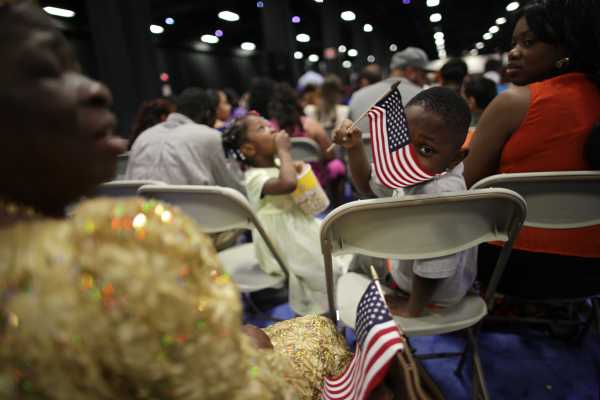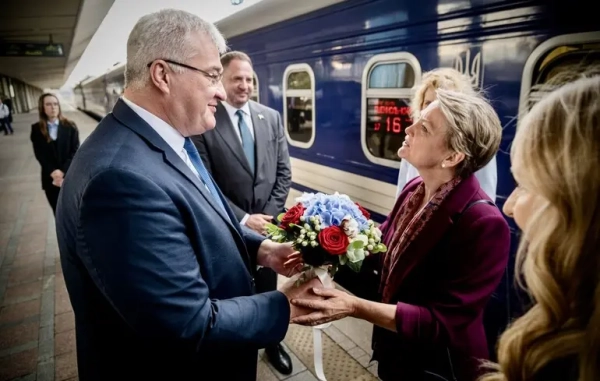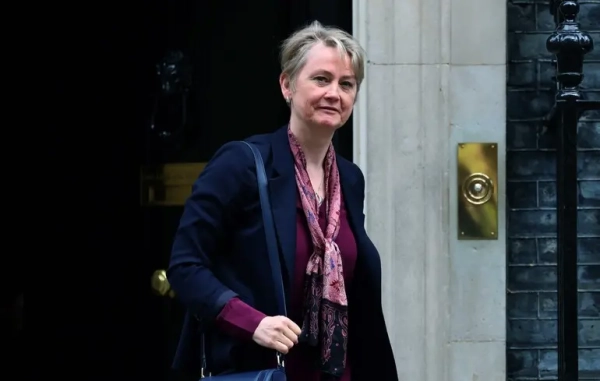
No country has more to lose from President Donald Trump’s decision to expand the travel ban than Nigeria.
Starting February 22, Nigerians will no longer be able to obtain visas allowing them to immigrate to the US permanently. They can still travel to the US on temporary visas, such as those for foreign workers, tourists, and students. But for the large Nigerian diaspora in the US, the policy could erode their deep family and cultural ties to their home country, Africa’s most populous nation and one of its economic powerhouses.
Nigerians make up by far the largest population of African immigrants living in the US, numbering about 327,000. Cities with thriving Nigerian communities will be particularly hard hit, including Dallas, Chicago, Baltimore, Atlanta, Phoenix and Houston, the latter of which has the largest Nigerian population outside Brazil and Africa.
Even more Nigerians have been choosing to settle here permanently in recent years: In 2018, the US granted Nigerians almost 14,000 green cards. By comparison, citizens from other countries included in the expanded travel ban were granted a combined total of fewer than 6,000 green cards. It’s also one of the top sending countries for foreign students, with almost 13,000 Nigerians students coming to the US last year.
But now, the Trump administration is preventing further legal immigration from Nigeria, citing concerns about the country’s security standards, as well as heightened terrorist threats. The administration wants to see Nigeria improve their information-sharing with US authorities and Interpol to help identify criminals and terrorists.
The situation has left many Nigerians wondering why they specifically have been targeted, when many other countries might pose similar security threats. Amaha Kassa, the executive Director of African Communities Together, which advocates for African immigrants and their families, told reporters Friday that, at the group’s latest meeting in New York City, dozens of Nigerians were asking one question: “Why single us out?”
Immigrant advocates say it’s based on discriminatory motivations.
“African immigrants in general and Nigerian immigrants in particular are among the most educated and successful immigrants in the United States,” Frank Sharry, the executive director of the immigration advocacy group America’s Voice, said in a statement. “But the success and contributions of African communities is beside the point for this administration. It’s not a policy announcement based on facts – it’s based on Trump’s desire to make America white again.”
The Trump administration was already targeting Nigerian immigrants
The Trump administration has been looking to decrease immigration from Nigeria for a long time, dating back to a now-infamous meeting in the Oval Office in June 2017. Trump told his advisers at the time that Nigerians who set foot in the US would never “go back to their huts” in Africa, the New York Times reported.
His administration has been restricting Nigerian immigration in the years since, clamping down on visitor visas.
Most Nigerians come to the US with employment-based visas or B visas, which are offered to short-term visitors, including tourists, business travelers, and people seeking urgent medical care. But the Trump administration has been denying Nigerians’ applications for B visas at high rates over the last two years.
In 2018, the most recent year for which data is available, about 57 percent of B visa applications from Nigeria were denied, putting it among the countries with the highest denial rates. That might be because Nigerians had the highest numbers of visa overstays of any African country in 2018, as well as one of the highest rates of visa overstays of any country. The administration also increased fees for Nigerians associated with certain temporary visa applications last year, imposing a potential financial barrier.
The administration has targeted African migration more broadly. The administration has attempted to gut the diversity visa lottery, under which 50,000 applicants from countries with low levels of immigration are selected at random to be granted green cards. For many Africans, it’s the only way that they can immigrate to the US.
It’s also stripped citizens of Sudan and Liberia of Temporary Protected Status, a protection allowing them to legally live and work in the US typically offered to citizens of countries suffering from natural disasters or armed conflict.
And advocates are calling the newly expanded ban an “African ban” since about four in five of those affected are from African nations. It’s a callback to the first version of the ban, unveiled in January 2017, which they called a “Muslim ban” since it initially targeted Muslim-majority countries.
“It’s not a pivot in the administration’s policy — it’s an escalation,” Kassa said.
Nigeria’s security situation
Trump’s proclamation instituting the expanded ban says that Nigeria fails to meet the US’s security standards in two ways: it doesn’t “adequately share public-safety and terrorism-related information” and presents a “high risk, relative to other countries in the world, of terrorist travel” to the US.
It’s true that Nigeria has long been fighting homegrown terrorism. Boko Haram, one of Africa’s largest Islamic militant groups, has killed almost 38,000 people since 2011 and displaced another 2.5 million. The violence has subsided since its peak from 2014 to 2015 after the Nigerian military, backed by neighboring African countries, pushed Boko Haram into the north of the country. But the group continues to terrorize some communities in other provinces, kidnapping women and children and engaging in suicide bombings.
But Toyin Falola, a Nigerian historian and professor at the University of Texas at Austin, said that few migrants from northern Nigeria, Boko Haram’s stronghold, come to the US. Moreover, Nigeria has been working with the US in its counterterrorism efforts and to build up its border security — Trump even acknowledges Nigeria as an “important strategic partner in the global fight against terrorism” in the proclamation.
Still, Trump says it isn’t enough: “These investments have not yet resulted in sufficient improvements in Nigeria’s information sharing with the United States for border and immigration screening and vetting,” he writes. He has consequently barred all permanent immigration to the US from Nigeria, except for those who are eligible for special immigrant visas based on providing assistance to the US government.
Still, if keeping out Nigeria’s terrorists is one of the primary purposes of the ban, it’s not clear why the Trump administration has chosen only to bar immigrants seeking to settle in the US permanently. A terrorist could just as well enter on a tourist visa, which calls into question whether the national security rationale behind the ban is legitimate.
Houston’s Rep. Sheila Jackson Lee, co-chair of the Congressional Nigeria Caucus, told reporters on Friday that the ban will have little benefit for the US’s fight against terrorism in Nigeria.
“Our efforts should be focused more on how we engage and help them [with the] internal and reckless actions by Boko Haram,” she said.
Sourse: vox.com






